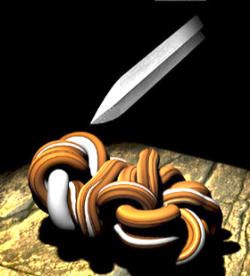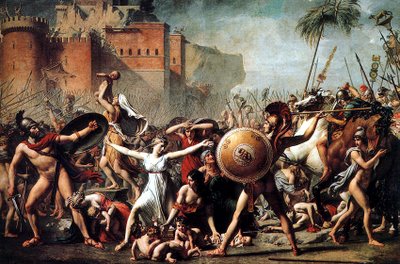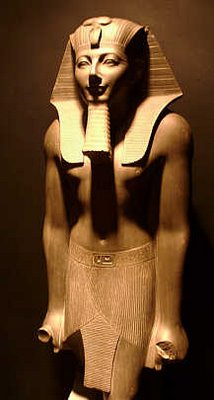Monday, September 25, 2006
Etruscans
-influenced by Greek culture
-influenced Roman culture in turn

Settlement of Rome
-Tiber River and Hills
-Latin language
Foundation myths:
-Romulus and Remus
-Rape of the Sabine Women
-sexual conquest; role of law
-Rape of Lucretia
--political action and female honor
--Roman Republic founded in 509 BC; overthrow of Etruscan king
-Government:
--2 Consuls
--Centuriate
--Senate
--Priests
"Struggle of the Orders" (between 494 and 287 BC)
--Plebeians and Patricians
--Tribunes; 12 Tables; marriage laws; one consulship; decisions of Plebeian assembly apply to the whole population
Territorial Expansion:
Punic Wars against Carthage
-First (264-241 BC); Second (218-201 BC); Third (149-146 BC)
-Rome successful; breaks treaty agreement
Second Punic War:
-flashpoint in Spain
-Hannibal
-Battles at Trebia River, Lake Trasimene and at Cannae: major defeats of the Romans
-Romans change tactics
--Publius Cornelius Scipio Africanus
--Battle of Zama (202 BC)
--"Delenda est Carthago"

Friday, September 22, 2006
Allexander's empire breaks apart
Egypt: Ptolemy I, founds Ptolomaic Dynasty
-powerful female rulers too
Babylon (Turkey to Afghanistan): Seleucus founds Seleucid Dynasty
-Revolt of the Maccabees
Macedon and Greece: under Antigonus Gonatas, founds Antigonid Dynasty
Greek outlook
-urban centers
-Koine
-Flourishing of art, literature, philosophy
---Septuagint

Philosophy turned inward; not in the service of the state or the gods
Cynics
-Antisthenes (ca. 445-360 BC)
--rejection of desires
-Diogenes (ca. 412-324)
Epicureans
-Epicurus of Samos (ca. 341-271 BC)
--choose pleasure rationally
--no fear
Stoicism
-Zeno of Cition (ca. 335-263)
--control of passions
Tuesday, September 19, 2006
End of Peloponnesian War
-source: Thucydides
-30 Tyrants in Athens
Three Philosophers
-Socrates (ca. 470-399 BC),
Plato (ca. 428-347 BC),
Aristotle (ca. 384-322 BC)
Socrates
-"Know Thyself"
-Socratic method: questions and answers

-Put on trial and sentenced to death

Plato
-Student of Socrates
-Academy
-Platonic Forms
-Analogy of the cave
Aristotle
-student of Plato
-Lyceum
-empiricism and observation
Rise of Macedon
-Philip II, king of Macedon (359-336 BC)
-Conquers Greek city-states; creates League of Corinth
-assassinated
-Alexander the Great becomes king
-imitates Achilles

-invades Persia and conquers empire by 331 BC

-incredible conquests stretching all the way to India
-dies in 323 BC
Monday, September 18, 2006
Aspasia (died ca. 410 B.C.)


Pericles (died ca. 429 B.C.)
Hoplite warriors
-provided their own weapons
-fight together as a unit : the phalanx
Persian Wars (490-479 B.C.)
-Marathon (490 B.C.)
-Thermopylae (480 B.C.)
Peloponnesian Wars (431-421 B.C. and 414-404 B.C.)
-Delian League vs. Peloponnesian League
Tuesday, September 12, 2006
Dark Age of Greek history, ca. 1100-750 B.C.
Homer, poet
-epics written between 750-700 B.C.
-The Iliad and The Odyssey
-The Iliad: Legendary Trojan War
--gods and heroes
--Hector and Andromache




Hesiod, poet and farmer
-wrote The Theogony, ca. 700 B.C.
-evolution of the world of the Greek gods and goddesses
-Gaia (earth goddess) replaced by patriarchal order of Zeus
-Pandora
Ethnos, Polis and Oikos
Ethnos = territorial unit
-led by oligarchy of leading men
Polis = city-state (pl. poleis)
-self-governing; all male citizens participate in public decision-making
-fortified hilltop, or acropolis
-marketplace, or agora
-colonies
Oikos = household
-A man was always the head of the household
-Women were always under the legal control of men
-Women's work was private; men's was public
-infanticide
-gender roles rigid; bisexuality very common, especially among upper classes
-for males, homosexuality was about domination and mentoring
-prostitutes (pornai) and courtesans (hetairai)
Zeus and Ganymede







































